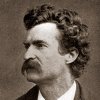“ Human nature in its great leading features is ever the same. ”
Plutarch, Moralia (c. 100 AD). copy citation
| Author | Plutarch |
|---|---|
| Source | Moralia |
| Topic | human nature |
| Date | c. 100 AD |
| Language | English |
| Reference | |
| Note | Translated by Arthur Richard Shilleto |
| Weblink | http://www.gutenberg.org/files/23639/23639-h/23639-h.htm |
Context
“horæ Momento cita mors venit aut victoria læta."
468 And so being dainty. See Athenæus, ii. ch. 76.
469 We see from this and other places that the mountebanks and quacks of the Middle Ages and later times existed also among the ancients. Human nature in its great leading features is ever the same. "Omne ignotum pro magnifico est."
470 "Laws," p. 729 C.
471 Homer, "Odyssey," i. 157; iv. 70; xvii. 592.
472 Ptolemy V., Epiphanes. The circumstances are related by Polybius, xv. 29; xvii. 35.
473 See "Acharnians,"”
source



